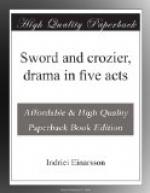Act V.—Brand and his little troop file into the warrior-filled hall of Kolbein. In vain they seek conciliation at any price with the chieftain, who is enraged by the slaying of his friend Thorolf, and infuriated beyond measure by the speeches of his implacable wife. Even Jorun’s offering her life for Brand’s does not soften his heart; when, finally, the prisoner-bishop’s threat of excommunication subdues Kolbein with the fear of the hereafter. Compensation is duly imposed upon the allies, and peace once more rules in the harried land.
The subject of the above drama was suggested by two or three rather meagre pages of the ‘Islendingasaga’ of Sturla Thordsson (ed. Vigfusson, ch. 146). To my notion, the poet has succeeded admirably in reproducing the cool coloring, the ironic-pessimistic attitude, that uncompromisingly masculine sentiment we know so well in their refreshing acerbity from the best sagas. Not the least meritorious thing in the play, by the way, is the very slight insistence on Thorolf’s relations to Helga, notwithstanding its temptation to the author of a social drama betraying strong influence of Ibsen; for the saga—it is to be borne in mind—is the literature of revenge and ambition as ruling motives, love having an incomparably smaller sphere allotted to it. Too much weight laid on that relation would have been ruinous to the total conception of the play.
In conformity to that conception are also the terse, pithy language which allows us to surmise the unlimited possibilities hidden in the saga literature, and the equally succinct manner of character drawing.
The most interesting figure in the drama is Brand, a Hamletic character without a Hamlet’s zest of retaliation—noble, generous, and beloved; yet ever a loser, because never resolutely willing the means to an end. As Thorolf avers scornfully, ’Brand lacks both the forethought before battle, and that fire in battle which wins the victory,’ The reign of lawlessness and bloodshed appalls him, to be sure; but he cannot see that his own irresolution is one of the causes. ’He is sick in his soul.’ But ’peace’!—cries Broddi—’whenever was peace gotten in feuds, excepting the battle be won or—lost.’ And yet, by the irony of fate, both his birth and his noble gifts make men look to Brand as Kolbein’s natural successor. The tigerish Kolbein himself is equaled in ruthless pursuit of his own ends, but not in good fortune, by Broddi. As foils to these larger characters stand out the mean, vengeful Einar, the brutal Alf, the insolent but brave Thorolf. In Jorun we fancy we see the living strength of Christian virtue and devotion opposed to the heathen fierceness and self-seeking of Helga. Between the two parties the bishop, whose motives and intentions are, however, not brought out with sufficient clearness. Like the proverbial fifth wheel of a wagon he seems out of place and embarrassing, whenever he appears—a predicament, to be sure, which he shares with the Church itself in those times, whenever not guided by a born ruler.




